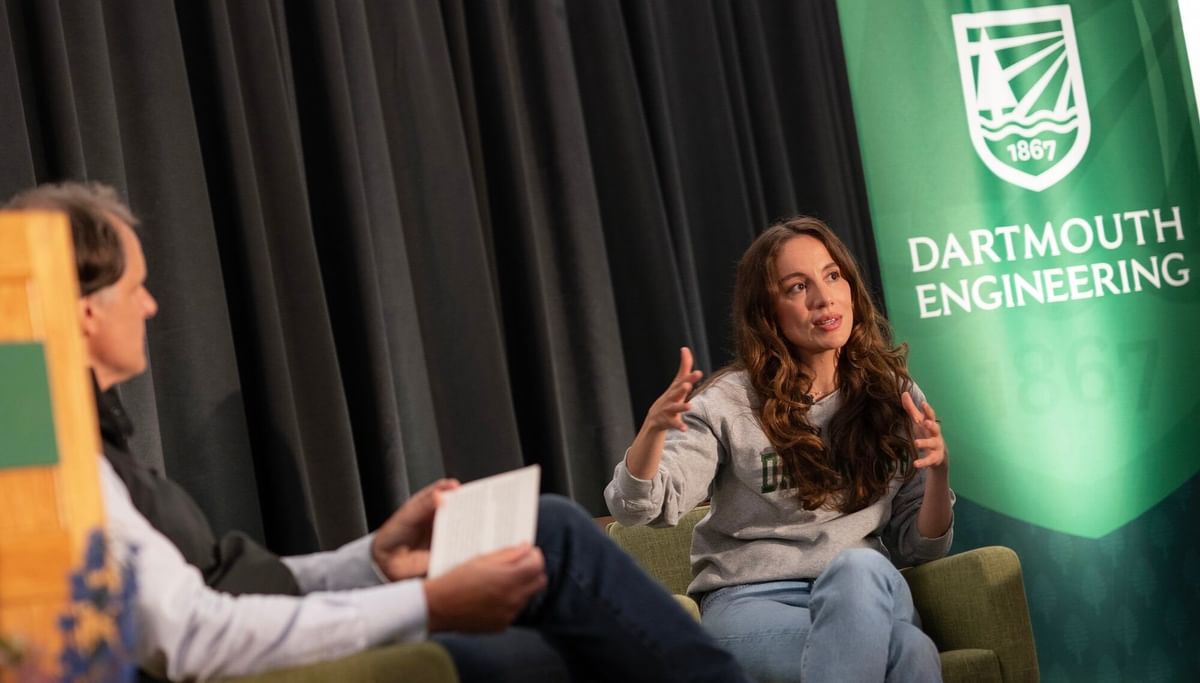- Undergraduate
Bachelor's Degrees
Bachelor of ArtsBachelor of EngineeringDual-Degree ProgramUndergraduate AdmissionsUndergraduate Experience
- Graduate
Graduate Experience
- Research
- Entrepreneurship
- Community
- About
-
Search
All Thayer News


OpenAI CTO Mira Murati Th'12 Shares Optimism for AI's Future
Jun 10, 2024 | by Matt Golec
AI is getting smarter. In fact, in coming years, computers may exhibit PhD-level intelligence for specific tasks, OpenAI's Chief Technology Officer Mira Murati Th'12 told an audience at Dartmouth's Thayer School of Engineering. And while that rings alarm bells for many, Murati predicts that smarter AI will not only be more helpful—but also safer.

(Photo by Mark Washburn)
Murati, who leads the development of some of OpenAI's most popular tools such as ChatGPT and DALL•E, said smarter, more capable AI doesn't have to mean more worries, because more advanced AI is better at keeping within human-constructed guardrails.
"For capabilities and safety, they're actually not separate domains," Murati said. "They go hand-in-hand. It's much easier to direct a smarter system by telling it, okay, just don't do these things."
Murati, who earned her bachelor of engineering from Dartmouth, spoke to approximately 200 attendees at a special "AI Everywhere" event in the Class of 1982 Engineering and Computer Science Center following Thayer's Investiture ceremony on Saturday. She was on campus to receive an honorary degree from Dartmouth at Commencement the next day.
The conversation, moderated by Dartmouth trustee Jeffrey Blackburn '91, a long-time executive at global digital media and technology companies including Amazon.com, focused on both the promise and concerns surrounding AI.
Murati's time at Tesla working on self-driving cars sparked her interest in learning more about AI. Murati said she joined OpenAI to dig deeper into the technology and because the company's mission of building safe artificial intelligence appealed to her.
Murati pointed out that AI is not completely new—it got its start at Dartmouth back in 1956 at a seminal conference on artificial intelligence.
"In a sense, we're building on decades and decades of human endeavor," she said.
Over time, the combination of advanced neural networks, increased computing power, and big data have produced transformative AI systems that can write documents, answer questions, and create images.
Blackburn raised concerns about AI-generated fake videos, such as one where Ukrainian President Volodymyr Zelenskyy appeared to surrender.
"This is our technology, so it's our responsibility how it's used," Murati said. "But, it's also a shared responsibility with society, civil society, government, content makers, media, and so on."
Murati advocated for regulation with advanced AI systems where the risks for harm are high. While there will never be zero risk of AI misuse, she suggested that providing access to AI tools can give people a better understanding of how to manage the technology.
"I think, perhaps, the most significant thing that ChatGPT did was to bring AI into the public consciousness, give people a real intuitive sense for what the technology is capable of, and also of its risks," she said.
When Blackburn asked what industries will be most impacted by AI, Murati gave a simple reply: "Everything."
"There's not going to be an area that won't be affected in terms of cognitive work," she said. "Maybe it's going to take a little bit longer to get into the physical world, but I think everything will be impacted by it."
While Murati said she couldn't predict exactly how jobs will be lost, changed, and gained, she said that collaborating with AI would allow people to shed repetitive tasks and equip them with tools to expand their creative work.
"So in that sense, I think it's actually going to be really incredible," she said.
Of course, challenges remain for AI. Murati said OpenAI is experimenting with ways to compensate content creators whose work is used by AI, and recent controversy with an AI voice that sounded similar to actress Scarlett Johansson was a reminder that things can get messy when computers sound like real people.
Murati suggested a process of iterative development, where a gradually increasing pool of real-world users could give feedback to help address these challenges with AI.
Jack Qiao, a master of engineering student studying computer engineering, appreciated how she emphasized user collaboration in the development process.
"You have to work along with people," he said.
Murati was asked by a student if she would do anything differently if she found herself back at school.
"I think I'd study the same things, but maybe with less stress," she said, as the audience laughed. She added, you should never stop learning. "It's good to have, especially now, a very broad range of subjects and get a bit of understanding of everything."

Students and faculty join Murati for a small group discussion. (Photo by Mark Washburn)
Alexis Abramson, dean of Thayer School of Engineering, described Murati as one of Dartmouth's most pioneering alums and said it was an honor to have her speak to the larger community.
"Not so long ago, Mira herself was a student at Thayer, building race cars in Allyn Lab with the Dartmouth Formula Racing team," she said, "Now, she is spearheading the development of technology that is shaping the future of AI as we know it."
Following the event, Murati joined graduate students in engineering and computer science, along with faculty whose expertise span artificial intelligence and intelligent systems, for a more intimate conversation.
The event was held in partnership with Dartmouth's Neukom Institute for Computational Science and Department of Computer Science.
For contacts and other media information visit our Media Resources page.
